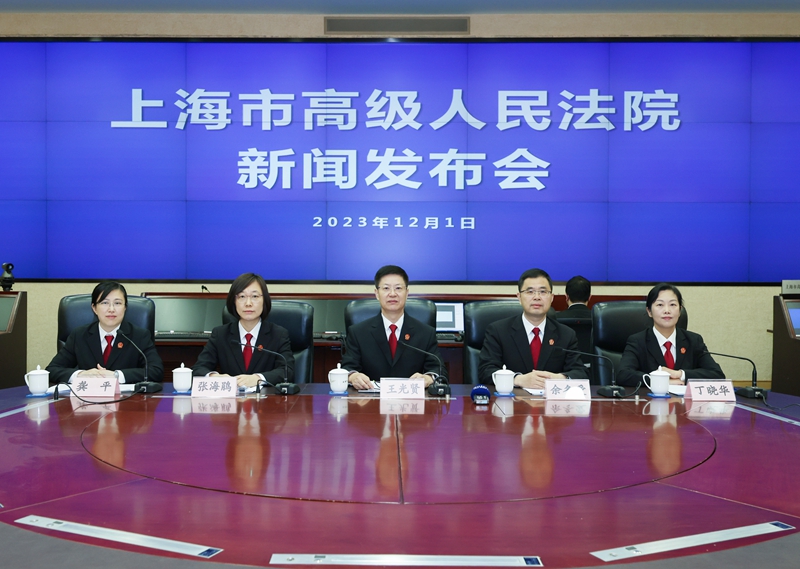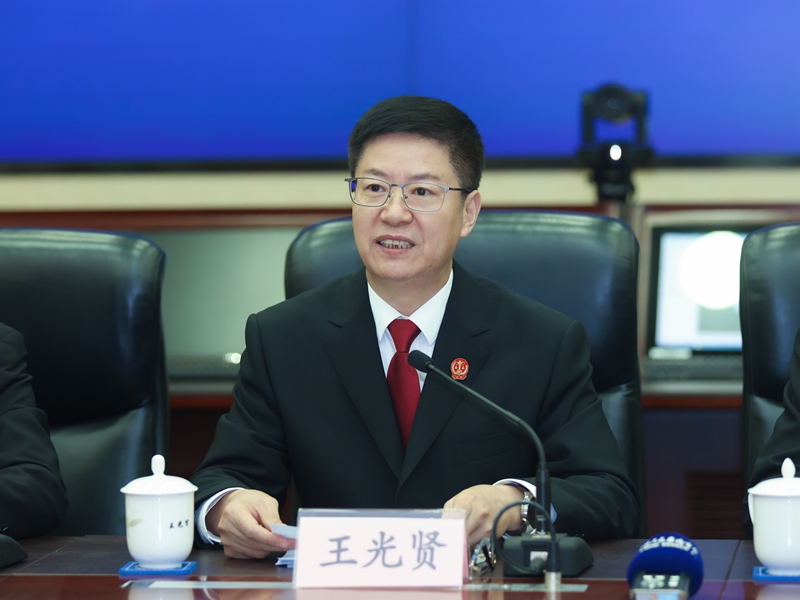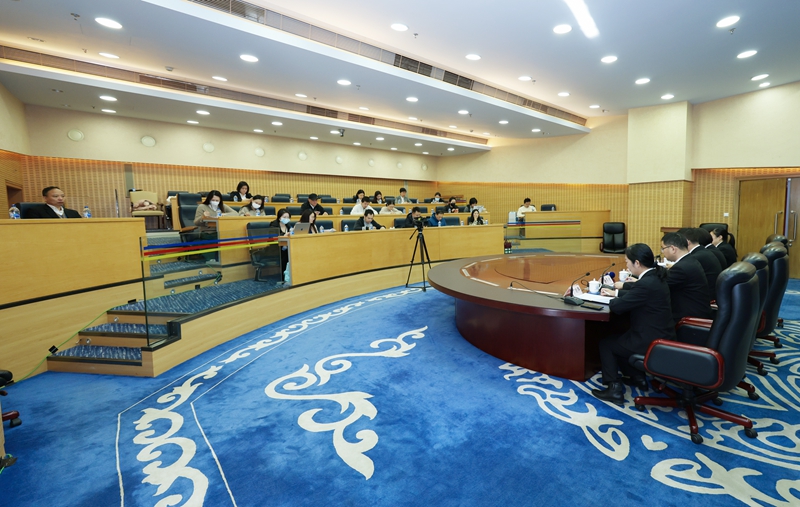
 Your current location >> Press Release
Your current location >> Press Release



On December 1, 2023, the Shanghai High People’s Court (SHPC) held a press conference to report how well the measures had been implemented in providing judicial services to ensure stable employment and boost consumption, along with the release of typical cases. It was the 30th in a series of press conferences aiming at modernizing the work of Shanghai courts. Wang Guangxian, vice president of the SHPC, and Yu Dongai, president of the Civil Division of the SHPC, reported the relevant situation. Judge Ding Xiaohua of the Shanghai No. 3 Intermediate People’s Court and Judge Gong Ping of the Shanghai Yangpu District People’s Court attended as representatives of typical case handlers. Zhang Haijuan, spokesperson and director of the Law Publicity Department (News Center) of the SHPC, hosted the press conference.
In order to implement the guiding principles of the Party’s 20th National Congress and the Central Economic Work Conference, and help with the implementation of the State Council’s package of policies, which are designed to stabilize the economy, in the judicial field of Shanghai, the SHPC issued, at the beginning of this year, the Implementation Plan of Providing Judicial Services to Guarantee Stable Employment and Implementation Plan of Providing Judicial Services to Boost Consumption. Since then, courts at all levels in Shanghai have given full play to their functions, taken multiple measures, increased the efforts in case handling, so as to ensure the high-quality economic and social development of Shanghai.
According to the press conference, from January to November, Shanghai courts concluded a total of 21,743 first-instance cases over labor contracts, a year-on-year increase of 64.79%. Among them, disputes caused by the termination of a labor contract account for 63.5%, an increase of 12 percentage points year-on-year. Such cases are characterized by an increase in compound claims by the parties concerned (for labor remuneration, overtime pay, compensation, etc.), a significant rise in group disputes (which are mostly seen in small, medium and micro enterprises in industries like catering, retail and wholesale, and human resources), and the emergence of new types of disputes concerning new situations (such as labor management and personal information protection arising from the algorithmic rules in new business types).
When hearing such cases, Shanghai courts paid particular attention to establishing a sound multi-channeled co-management mechanism for labor disputes and promoting the management of litigation sources. For example, the Shanghai Pudong New Area People’s Court established a platform to cover the whole process of handling labor disputes, such as grassroots mediation, labor arbitration, case filing, judgment, and enforcement, in order to resolve the local labor disputes as quickly as possible and extend judicial services to the front end of social governance. The courts have guaranteed stable employment by 1) protecting the special groups such as workers with illnesses or work-related injuries, female workers in pregnancy, lying-in, or lactation period, and migrant workers; and 2) implementing the national policies in ensuring employment and production and reopening the economy, and helping enterprises out of trouble by supporting their phased reduction and deferral in social insurance. They also support employment in multiple channels and new business formats and help promote the sustainable development of the platform economy; and fully stimulate the strong potential of the platform economy and new employment forms in leading development, creating jobs, and surviving international competition.
Judge Gong Ping introduced a case handled by her at the press conference: A company decided to terminate the labor contract with a pregnant employee on the grounds that the employee’s attendance for less than eight hours on multiple working days during her employment had constituted early leave, and the number of early leave had reached the level of serious disciplinary violation stipulated in the employee handbook. After listening to the both parties and reviewing the evidence provided by them, the court found that the definition of early leave in the employee handbook was not clear, and the company had raised no objection to the employee’s early leave before; the court thus supported the employee’s request to restore her labor relations with the company in order to protect the legitimate rights and interests of female employees in pregnancy, lying-in, or lactation period. Judge Gong said that employment is the foundation of people’s livelihood; and it is the responsibility of the court to balance the interests of and bring justice to both parties when handling disputes between the employees and employers. She hoped that through their work, they can provide strong judicial services and guarantees for stable employment.
According to the press conference, from January to November 2023, Shanghai courts concluded a total of 79,309 first-instance consumer cases, a year-on-year increase of 46.54%. Such cases are characterized by a surge in number (with an increase of over 100% in the number of disputes over network service contracts and catering service contracts, respectively), the concentration of types (with 75% of the disputes over service contracts involving industries like fitness, education and training), and the emergence of disputes in new consumer formats (such as new retail formats, sharing economy, and new individual economy).
When hearing such cases, Shanghai courts attached great importance to maintaining a fair, honest, and efficient consumer market. On the one hand, they would made joint efforts to resolve consumer disputes via multiple channels; on the other hand, they would work to promote governance through digital empowerment. They would also help cultivate new types of consumption, and provide precise judicial protection through the production and distribution of judicial advice, white papers, etc. for different fields such as advance payment, new consumption formats, and cross-border consumption; promote civil public interest litigation over consumption, create new models of civil public interest litigation over consumption, improve the linkage mechanism between the civil public interest litigation and private interest litigation over consumption, exert the legal effect of civil public interest litigation in protecting social and public interests, and amplify the demonstration effect of public interest litigation.
Judge Ding Xiaohua introduced a civil public interest case over consumption handled by her at the press conference; it was the first ever handled by a Shanghai court that concerned the safety of bottled drinking water. In this case, the court explored a new approach to civil public interest litigation over consumption, gave full play to the accountability function of the punitive compensation system, cracked down on illegal production and business operations, and protected the base line of food safety. Judge Ding said that the judgment teaches packaged drinking water producers and operators to always put water safety first, strictly control the production process, be responsible to society and the public, and provide customers with safe water.
“One case teaches more than a stack of documents.” Shanghai courts also released ten typical cases in order to give full play to their exemplary and leading role. Yu Dongai said that the ten cases, five on “stabilizing employment” and five on “promoting consumption,” cover various key areas related to employment and consumption, such as multi-channeled co-governance, protection of special workers’ rights and interests, protection of personal information, standardization of market operation order, and civil public interest litigation over consumption.
In one case, for example, the employer, while having no evidence on the employee’s disciplinary violations, decided to terminate the labor contract on the grounds that the employee did not meet the employment conditions the probation period. The court protected the legitimate rights and interests of the employee by ruling that the employer restore the labor relations and pay the employee remuneration for the recovery period, which set a good example for guaranteeing employment and protecting workers’ labor rights.
In another case, the fitness company arranged a new coach for the client as the old coach had left the company; the court supported the client’s claim for an end to the fitness courses and a refund. This case involves advance payment; it clarifies that when the agreed coach leaves the company, the fitness service provider should negotiate with the client and obtain the latter’s consent for major changes in the contract, which will help promote advance prepayment in the consumer market.
Wang Guangxian said that Shanghai courts will continue to play their role in the trial of labor and consumer cases, send the important messages through case handling, transmit the warmth of justice and point the right direction for development, continue to guarantee stable employment and boost consumption, and contribute to building Shanghai into a modern socialist metropolis with world influence.
Typical Cases Handled by Shanghai Courts to Stabilize Employment and Promote Consumption
>> Chinese Version